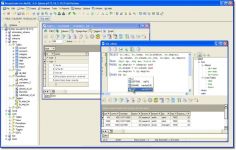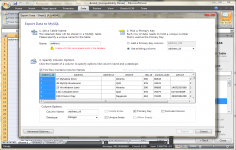 MySQL 5.1.35
MySQL 5.1.35
MySQL AB - (Open Source)
MySQL is a successful open source database used in most web applications, e-commerce and online transaction processing.
MySQL is one of the world's most famous and used open source database. The software can be used to manage web applications, e-commerce and online transaction processing since MySQL database incorporates support those transactions. It is also commonly associated with PHP when it comes to managing websites.
With standard JDBC , ODBC, and Net, the developer can choose the programming language. MySQL has the advantage of working with almost all the popular operating systems and communicate easily with programming languages ​​such as C, C + +, VB, C #, PHP, Python, Ruby, Java, Perl, Eiffel, etc.MySQL replication allows you to create profitable applications. In addition, it enables the development of typologies replication complex and massive chain.Its reliability and robustness, performance, ease of use makes MySQL have more success than anticipated.
- Title:
- MySQL 5.1.35
- File Size:
- 35.7 MB
- Requirements:
- Windows 9x / 2000 / XP / Vista / Windows7 / Windows8
- Language:
- en-us
- License:
- Open Source
- Date Added:
- 04 Jun 2009
- Publisher:
- MySQL AB
- Homepage:
- http://www.mysql.com
- MD5 Checksum:
- E95A2AD2AEE9107FE5A4F80ECA381E7B
* The .msi installer does not detect an existing root password on the initial configuration attempt. To work around this, install and configure MySQL as normal, but skip any changes to security. (There is a checkbox that allows this on the security screen of the configuration wizard.) Then check your settings:
o If the old root password and security settings are okay, you are done and can proceed to use MySQL.
o Otherwise, reconfigure with the wizard and make any changes on the second configuration attempt. The wizard will properly prompt for the existing root password and allow changes to be made.
This issue has been filed as Bug#45200 for correction in a future release.
* The Windows configuration wizard allows changes to InnoDB settings during a reconfiguration operation. For an upgrade, this may cause difficulties. To work around this, use one of the following alternatives:
o Do not change InnoDB settings.
o Copy files from the old InnoDB location to the new one.
This issue has been filed as Bug#45201 for correction in a future release.
Bugs fixed:
* Important Change: Replication: The transactional behavior of STOP SLAVE has changed. Formerly, it took effect immediately, even inside a transaction; now, it waits until the current replication event group (if any) has finished executing, or until the user issues a KILL QUERY or KILL CONNECTION statement.
This was done in order to solve the problem encountered when replication was stopped while a nontransactional slave was replicating a transaction on the master. (It was impossible to roll back a mixed-engines transaction when one of the engines was nontransactional, which meant that the slave could not safely re-apply any transaction that had been interrupted by STOP SLAVE.) (Bug#319, Bug#38205)
See also Bug#43217.
* Partitioning: When a value was equal to a PARTITION ... VALUES LESS THAN (value) value other than MAXVALUE, the corresponding partition was not pruned. (Bug#42944)
* Replication: Unrelated errors occurring during the execution of RESET SLAVE could cause the slave to crash. (Bug#44179)
* Replication: The --slave-skip-errors option had no effect when using row-based logging format. (Bug#39393)
* Replication: The following erors were not correctly reported:
o Failures during slave thread initialization
o Failures while initializing the relay log position (immediately following the starting of the slave thread)
o Failures while processing queries passed through the --init_slave option.
Information about these types of failures can now be found in the output of SHOW SLAVE STATUS. (Bug#38197)
* Replication: Killing the thread executing a DDL statement, after it had finished its execution but before it had written the binlog event, caused the error code in the binlog event to be set (incorrectly) to ER_SERVER_SHUTDOWN or ER_QUERY_INTERRUPTED, which caused replication to fail. (Bug#37145)
See also Bug#27571, Bug#22725.
* Replication: Column alises used inside subqueries were ignored in the binary log. (Bug#35515)
* Valgrind warnings for the DECODE(), ENCRYPT(), and FIND_IN_SET() functions were corrected. (Bug#44358, Bug#44365, Bug#44367)
* On Windows, entries for build-vs9.bat and build-vs9_x64.bat were missing in win/Makefile.am. (Bug#44353)
* Incomplete cleanup of JOIN_TAB::select during the filesort of rows for a GROUP BY clause inside a subquery caused a server crash. (Bug#44290)
* Not all lock types had proper descriptive strings, resulting in garbage output from mysqladmin debug. (Bug#44164)
* Use of HANDLER statements with INFORMATION_SCHEMA tables caused a server crash. Now HANDLER is prohibited with such tables. (Bug#44151)
* Invoking SHOW TABLE STATUS from within a stored procedure could cause a Packets out of order error. (Bug#43962)
* myisamchk could display a negative Max keyfile length value. (Bug#43950)
* On 64-bit systems, a key_buffer_size value larger than 4GB could couse MyISAM index corruption. (Bug#43932)
* mysqld_multi incorrectly passed --no-defaults to mysqld_safe. (Bug#43876)
* SHOW VARIABLES did not properly display the value of slave_skip_errors. (Bug#43835)
* On Windows, a server crash occurred for attempts to insert a floating-point value into a CHAR column with a maximum length less than the converted floating-point value length. (Bug#43833)
* Incorrect initialization of MyISAM table indexes could cause incorrect query results. (Bug#43737)
* libmysqld crashed when it was reinitialized. (Bug#43706, Bug#44091)
* InnoDB uses random numbers to generate dives into indexes for calculating index cardinality. However, under certain conditions, the algorithm did not generate random numbers, so ANALYZE TABLE did not update cardinality estimates properly. A new algorithm has been introduced with better randomization properties, together with a system variable, innodb_use_legacy_cardinality_algorithm, that controls which algorithm to use. The default value of the variable is 1 (ON), to use the original algorithm for compatibility with existing applications. The variable can be set to 0 (OFF) to use the new algorithm with improved randomness. (Bug#43660)
* UNION of floating-point numbers did unnecessary rounding. (Bug#43432)
* ALTER DATABASE ... UPGRADE DATA DIRECTORY NAME failed when the database contained views. (Bug#43385)
* Certain statements might open a table and then wait for an impending global read lock without noticing whether they hold a table being waiting for by the global read lock, causing a hang. Affected statements are SELECT ... FOR UPDATE, LOCK TABLES ... WRITE, TRUNCATE TABLE, and LOAD DATA INFILE. (Bug#43230)
* Using an XML function such as ExtractValue() more than once in a single query could produce erroneous results. (Bug#43183)
See also Bug#43937.
* Full-text prefix searches could hang the connection and cause 100% CPU consumption. (Bug#42907)
* InnoDB had excessive contention for a character set mutex. (Bug#42649)
* Incorrect elevation of warning messages to error messages for unsafe statements caused a server crash. (Bug#42640)
* CHECK TABLE suggested use of REPAIR TABLE for corrupt tables for storage engines not supported by REPAIR TABLE. Now CHECK TABLE suggests that the user dump and reload the table. (Bug#42563)
* Compressing a table with the myisampack utility caused the server to produce Valgrind warnings when it opened the table. (Bug#41541)
* For a MyISAM table with DELAY_KEY_WRITE enabled, the index file could be corrupted without the table being marked as crashed if the server was killed. (Bug#41330)
* Killing an INSERT ... SELECT statement for a MyISAM table could cause table corruption if the table had indexes. (Bug#40827)
* A multiple-table DELETE IGNORE statement involving a foreign key constraint caused an assertion failure. (Bug#40127)
* Multiple-table UPDATE statements did not properly activate triggers. (Bug#39953)
* The mysql_setpermission operation for removing database privileges removed global privileges instead. (Bug#39852)
* A stored routine contain a C-style comment could not be dumped and reloaded. (Bug#39559)
* In an UPDATE or DELETE via a secondary index, InnoDB did not store the cursor position. This made InnoDB crash in semi-consistent read while attempting to unlock a nonmatching record. (Bug#39320)
* The functions listed in Section 11.13.4.2.3, “Creating Geometry Values Using MySQL-Specific Functionsâ€Â, previously accepted WKB arguments and returned WKB values. They now accept WKB or geometry arguments and return geometry values.
The functions listed in Section 11.13.4.2.2, “Creating Geometry Values Using WKB Functionsâ€Â, previously accepted WKB arguments and returned geometry values. They now accept WKB or geometry arguments and return geometry values. (Bug#38990)
* On WIndows, running the server with myisam_use_mmap enabled caused MyISAM table corruption. (Bug#38848)
* CHECK TABLE did not properly check whether MyISAM tables created by servers from MySQL 4.0 or older needed to be upgraded. This could cause problems upgrading to MySQL 5.1 or higher. (Bug#37631)
* An UPDATE statement that updated a column using the same DES_ENCRYPT() value for each row actually updated different rows with different values. (Bug#35087)
* For shared-memory connections, the read and write methods did not properly handle asynchronous close events, which could lead to the client locking up waiting for a server response. For example, a call to mysql_real_query() would block forever on the client side if the executed statement was aborted on the server side. Thanks to Armin Schöffmann for the bug report and patch. (Bug#33899)
* CHECKSUM TABLE was not killable with KILL QUERY. (Bug#33146)
* myisamchk and myisampack were not being linked with the library that enabled support for * filename pattern expansion. (Bug#29248)
* For InnoDB tables that have their own .ibd tablespace file, a superfluous ibuf cursor restoration fails! message could be written to the error log. This warning has been suppressed. (Bug#27276)
* COMMIT did not delete savepoints if there were no changes in the transaction. (Bug#26288)
* Several memory allocation functions were not being checked for out-of-memory return values. (Bug#25058)
Related software
2.1/5 from 178 users


